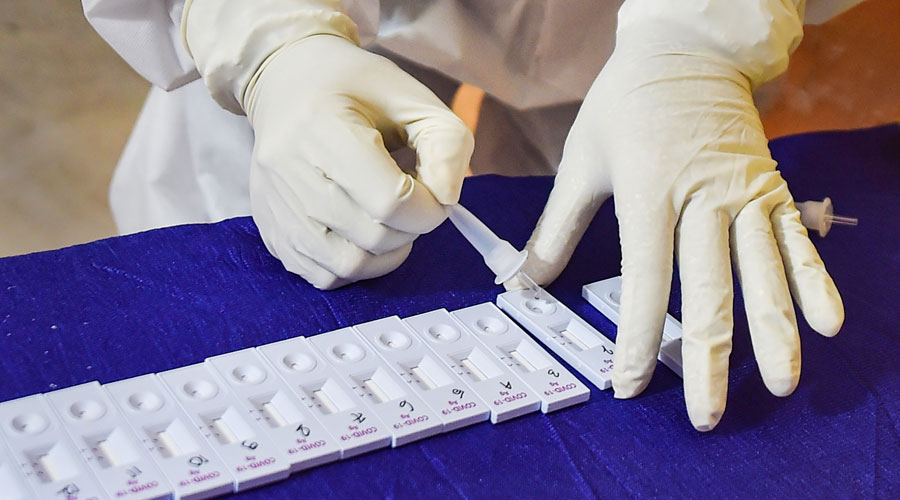India had the highest counts of rumours and misleading information about the new coronavirus disease circulating on social media and online platforms, followed by the US and China, a study on the Covid-19-related infodemic has suggested.
The study by health researchers in Bangladesh has identified India, the US, China, Indonesia and Brazil as the top five among 87 countries where rumours, stigma or conspiracy theories circulated as infodemic waves from January to early April, the timeframe of the survey.
Their exercise, described as the first global study to track and document adverse impacts, including deaths, from Covid-19-related misinformation, has counted 357 rumours, stigma or conspiracy theories circulating in India, 307 in the US and 189 in China.
“It wasn’t possible for us to trace the actual sources of the rumours,” M. Saiful Islam, who led the study, told The Telegraph over phone from Dhaka. Islam is an infectious disease specialist at the International Centre for Diarrhoreal Disease Research, Bangladesh.
The study, which scanned online platforms including fact-check agency websites, Facebook and Twitter, has been published in the American Journal of Tropical Medicine and Hygiene.
Many rumours related to false or unsubstantiated claims about remedies that might cure or prevent the infection — cow urine, cow dung, alcohol, rose water, vinegar gargles, warm socks, goose fat, sesame oil, vitamin C, vitamin D and hot drinks laced with turmeric or cinnamon — were circulating among people through social media across the world.
Scientists in India have independently tracked at least 28 hoaxes or rumours shared through social media accounts — some misleadingly touting tea, garlic, kalonji seeds, steam inhalation and nasal rinses as remedies, some claiming air-conditioners, houseflies and mosquitoes spread the infection, and one even claiming that clapping hands can drive away the virus.
After the March 22 event when Prime Minister Narendra Modi urged people to bang pots and pans to honour healthcare workers engaged in combating the coronavirus, scientists say, a rumour emerged that vibrations from sound can eliminate the virus.
“There was blind belief in such things — many people believed the messages they received,” said Aniket Sule, a faculty member at the Homi Bhabha Centre for Science Education, Mumbai, who is among the scientists in India who created a website to debunk Covid-19 hoaxes.
The study by Saiful Islam and his collaborators in Australia, Thailand and Japan has documented cases of deaths or illness, discrimination, physical harassment and violence resulting from such rumours about cures or prevention.
In India, at least 12 persons, including five children, fell sick after drinking liquor made from the seeds of the Datura plant after watching a video claiming the seeds provide immunity against Covid-19.
In Iran, doctors documented over 800 deaths among over 5,800 people hospitalised after drinking methanol as a remedy against Covid-19. At least 60 of them have gone blind. In Qatar, two persons ingested disinfectants.
The misleading information also triggered stigma and discrimination.
Doctors in India and Australia have reported harassment and discrimination by neighbours. The Chinese in some countries have faced discrimination and racial abuse amid misleading messages claiming “Chinese dietary habits have caused Covid-19” or the “Chinese had manufactured Covid-19”, or “every disease has come from China”.
Rumours, stigma and conspiracy theories have the potential to decrease community trust in governments and international health agencies, M. Saiful Islam and his colleagues wrote in their study, pointing out that rumours can mask credible infection prevention and control strategies.
“Policymakers should track misinformation in realtime and correct wrong information,” M. Saiful Islam said. “Since misinformation spreads so quickly through social media, policymakers should also use this platform to spread correct information.”
M. Saiful Islam said the idea to track rumours about Covid-19 occurred to him after he noticed a doctor in Bangladesh suggesting on a social media account that the coronavirus would go away with the approach of summer.
“There was no evidence for this at all,” M. Saiful Islam said. “But so many people appeared to believe it.” In Bangladesh, he said, there have been other rumours too, one with tragic consequences.
A mother who learnt her son was infected with Covid-19 died after suffering a heart attack. M. Saiful Islam said: “She had heard this absurd rumour that people infected by Covid-19 would be killed.”











